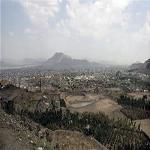01 April 2010

Photo: AP
A view of the Sana'a seen from one of the mountains surrounding and overlooking the capital of Yemen (file photo)
As Yemeni scientists watch with horror, major cities are running out of water, and pollution and erratic weather patterns are destroying farmlands. And while permanent solutions are nowhere to be found, a new style of tourism offers a small comfort: a "cleaning climb." Hundreds of tourists, students and professional climbers gathered this morning to rock-climb in the Yemeni mountains, while picking up the trash that pollutes the local water and soil.
In Yemen's ancient villages, where most of the people in the country live, there is often not a lot- not a lot of money, not a lot of water, and not a lot to do.
There is, however, and abundance of garbage. In this village tucked into a rocky mountainside, piles of household refuse tumble down the winding streets and pollute the otherwise picturesque gardens and terrace farms.
Locals joke that Yemeni trees are actually blue and red, the color of the plastic bags that you get when you buy qat, a mildly narcotic leaf, and the Yemeni national past time. But this morning, for the first time in a long time, a few of the trees were green.
Some of the people rappelling down this mountain have never rock-climbed before and the crowd cheers as they land. They came to the village to clean up the trash, climb the massive rocks atop the mountain, and later have a picnic.
Cleaning and climbing
Addie Byrum, a NGO worker from Pittsburgh, Pennsylvania says the idea is to gather adventure/travelers looking for good times, and combine the event with good works. Before hitting the rocks, climbers donned plastic gloves and garbage bags and sent trucks, loaded with about 400 bags to the local dump.
"I think the climbing thing is good to bring people here and get them interested. But the cleaning is probably the most useful part of this whole thing," said Byrum.
In Yemen, when you finish your soda, it is customary to toss the can onto the street. And while much of the countryside in the remote, largely undeveloped country remains pristine, garbage in the villages piles up almost unchecked.
Environmental awareness
Joshua Maricich, the head of the Yemen Adventure Club, the organization that ran this event, said that by bringing tourists, expats and villagers to clean it up together, he hopes the event will begin to foster a culture of environmental awareness.
"We need education in these villages. They don't like having their villages being filthy. Someone just needs to give them a little spark," he said.
More than 50,000 children die each year in Yemen because of diseases caused by water pollution. Malaria, diarrhea, and typhoid- water-related diseases that are not fatal in First World countries- cause half of the child deaths in Yemen.
Pollution, drought and erratic weather patterns caused by climate change have already decimated much of Yemen's farmlands. And many say the beleaguered nation is soon to have the first capital city without any clean drinking water. Yet despite these pending and ongoing disasters, environmental awareness remains rare in a country where half the people live on less than $2 a day.
Sixteen-year-old Mota, like many of the school children who live in the village, came to help visitors clean. Mota says if the village is clean, more tourists will come, and bring income to the desperately poor area.
When the targeted area was cleaned up Thursday morning and the first truck was loaded, village children suggested they take more bags into other neighborhoods. But the suggestion was lost on the older teenage cleaners, who raced up the mountain to start rock climbing and repelling.
But in their enthusiasm, it became apparent that Yemen's habit of dropping trash could not be broken with one event. Many of the teens dropped their plastic gloves on the mountainside along the way.